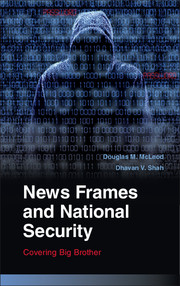Book contents
- Frontmatter
- Contents
- Preface and Acknowledgments
- Introduction
- Part I Conceptual Framework
- Part II Framing Effects Research
- Part III Implications and Conclusions
- 8 Covering “Big Brother”
- Appendix A Measurement Details for Arab Study
- Appendix B Measurement Details for Response Latency
- Appendix C Measurement Details for Activist Study: Close-Ended Responses
- Appendix D Measurement Details for Activist Study: Open-Ended Responses
- Bibliography
- Index
8 - Covering “Big Brother”
Published online by Cambridge University Press: 18 December 2014
- Frontmatter
- Contents
- Preface and Acknowledgments
- Introduction
- Part I Conceptual Framework
- Part II Framing Effects Research
- Part III Implications and Conclusions
- 8 Covering “Big Brother”
- Appendix A Measurement Details for Arab Study
- Appendix B Measurement Details for Response Latency
- Appendix C Measurement Details for Activist Study: Close-Ended Responses
- Appendix D Measurement Details for Activist Study: Open-Ended Responses
- Bibliography
- Index
Summary
“The consciousness of being at war, and therefore in danger, makes the handing-over of all power to a small caste seem the natural, unavoidable condition of survival.”
– George Orwell in 1984“There are many other things that are excluded from the official framing of the ‘global war on terror,’ such as oil, the economy, the deficit, health care, jobs, education, taxes, and the effects of global trade. The implication is that none of these things matter if every American is in mortal danger, even those in the swing states where there’s little to no chance of a terrorist strike. But rationality is not at issue here. People think in terms of frames.”
– George Lakoff Professor of Linguistics at U. of California – Berkeley August 31, 2004Framing that enhances a sense of danger and threat is a potent tool in the hands of powerholders. If the research presented in this book is any indication, this influence is bestowed by the factors that shape the production of news, not the least of which are the codes and practices of the journalistic profession. When covering the tension between national security and civil liberties – that is, reporting on the government’s massive surveillance powers – journalists tended to construct news reports on that basis of these conventions, emphasizing the conflict between these contending values while trying to find ways to personify and personalize the policy debate. Framing coverage around principled conflicts and individual instances are longstanding news values (Price and Tewksbury, 1997). Although framing news around “rights talk” has been well studied (Shah et al., 1996; Brewer, 2007), in this book we find it is this personification – framing stories in individual as opposed to collective terms – that plays such an important role in shaping the responses of audiences, their thought processes, their mental sophistication, their social tolerance, and their political expression. Such individual framing is a fixture of news construction, particularly when covering “Big Brother.”
- Type
- Chapter
- Information
- News Frames and National SecurityCovering Big Brother, pp. 159 - 174Publisher: Cambridge University PressPrint publication year: 2014



